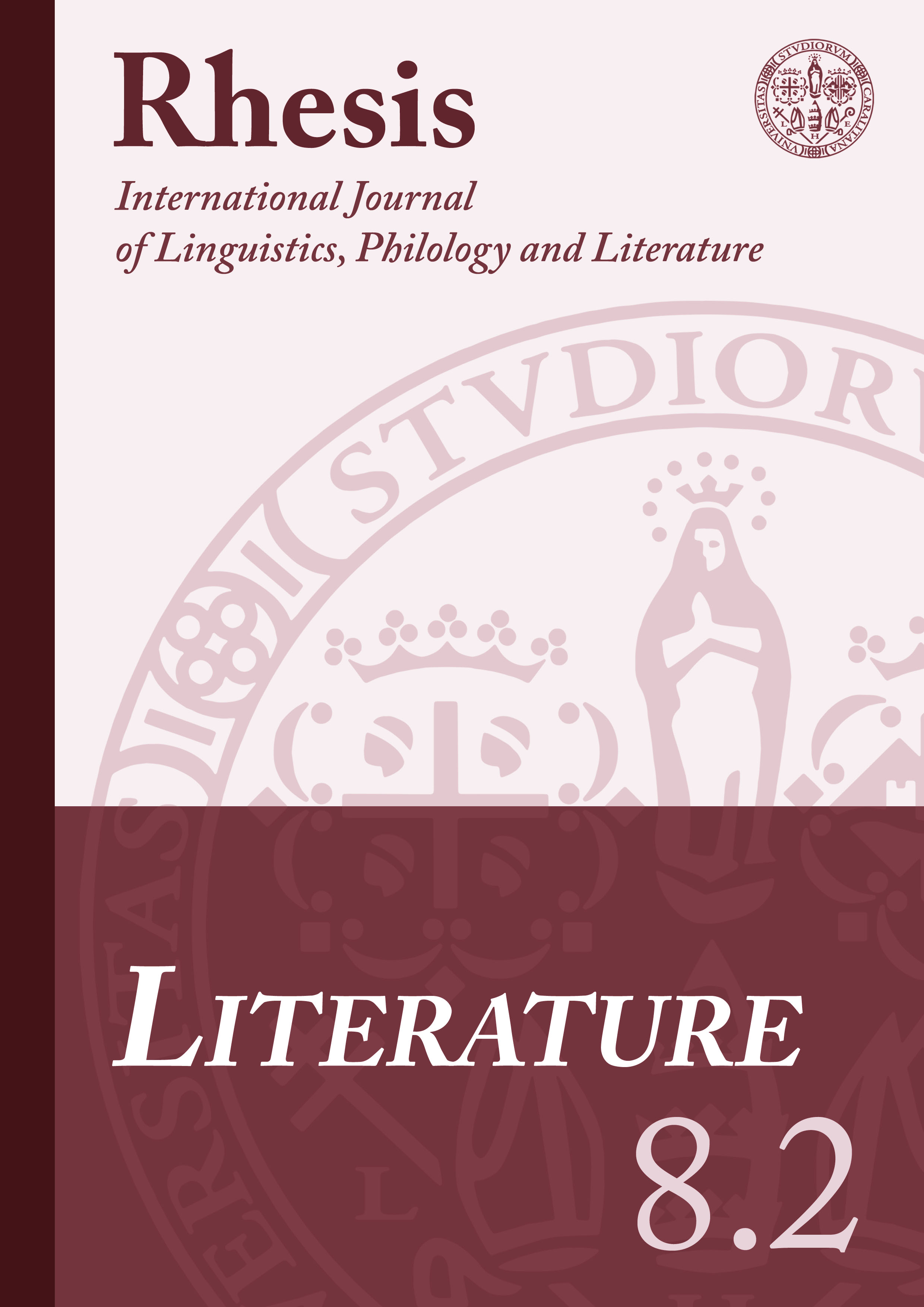In search of a female identity: the suppressed mother in Elizabeth Bowen’s The Last September
Abstract
The Last September (1929) is a novel particularly significant in Bowen’s reflection on the definition of the female identity and on the role of the relationship with other women in determining a woman’s possibilities for self-determination. Starting from Marianne Hirsch’s analysis of mother-daughter plots, this contribution aims to illustrate the reasons for which the initial destabilizing role of the protagonist Lois against the conservatism of the family transforms, in the end, into passivity and subordination. This passage, following both Hirsch and Irigaray’s thought, is due to two factors: the removal of the protagonist’s origins, especially those relating to her mother, and the impossibility of a female genealogy for her surrogate mother and other women belonging to a patriarchal value system.
Downloads
References
BOWEN, Elizabeth, The Shadow Across the Page, ed. Maud ELLMANN, Edinburgh, Edinburgh University Press, 2003.
BOWEN, Elizabeth, The Heat of the Day, London, Jonathan Cape, 1948; repr. London, Vintage, 1998.
BOWEN, Elizabeth, Bowen’s Court, London, Longman Green, 1942.
BOWEN, Elizabeth, The House in Paris, London, Gollancz, 1935; repr. Harmondsworth, Penguin, 1976.
BOWEN, Elizabeth, The Last September, London, Constable, 1929; repr. New York, Random House, 2000, ebook.
BROOKS, Peter, Reading for the Plot. Design and Intention in Narrative, Cambridge (MA) and London, Harvard University Press, 1984.
CAVARERO, Adriana, Nonostante Platone. Figure femminili nella filosofia antica, Roma, Editori Riuniti, 1990.
CHODOROW, Nancy, The Reproduction of Mothering. Psychoanalysis and the Sociology of Gender, Berkeley/Los Angeles/London, University of California Press, 1978.
CORCORAN, Neil, Elizabeth Bowen. The Enforced Return, Oxford, Clarendon Press, 2004.
DALLAGIOVANNA, Giulia, “‘From Somewhere to Nowhere to Back Again’: the Dynamics of Placement and Displacement in Elizabeth Bowen’s Early Novels”, «Il Confronto Letterario», 66.1 (2016), pp. 333-351.
DEL MAR RUIZ MARTÍNEZ, María, “Elizabeth Bowen and the Anglo-Irish. Describing women in The Last September”, «Babel-Afial», 19 (2010), pp. 97-112.
DEUTSCH, Helene, The Psychology of Women. A Psychoanalytic Interpretation, New York, Grune and Stratton, 1944.
DONADI, Paola, Generi: differenze nelle identità, Milano, FrancoAngeli, 2000.
ELLMANN, Maud, Elizabeth Bowen: The Shadow Across the Page, Edinburgh, Edinburgh University Press, 2003.
ESTY, Joshua, “Virgins of Empire: The Last September and the Antidevelopment Plot”, «MFS Modern Fiction Studies», 53.2 (Summer 2007), pp. 257-275.
FOSTER, Roy F., Modern Ireland 1600-1972, London, Allen Lane, 1988.
FREUD, Sigmund, Jenseits des Lustprinzips, Leipzig/Wien/Zurich, Internationaler Psychoanalytischer Verlag, 1920; English translation by James Strachey, Beyond the Pleasure Principle, New York/London, W. W. Norton and Company, 1961.
GENET, Jacqueline (ed.), The Big House in Ireland: Reality and Representation, Dingle, Brandon, 1991.
HIRSCH, Marianne, The Mother / Daughter Plot: Narrative, Psychoanalysis, Feminism, Bloomington/Indianapolis, Indiana University Press, 1989.
INGMAN, Heather, Women’s Fiction Between the Wars. Mothers, Daughters and Writing, Edinburgh, Edinburgh University Press, 1998.
IRIGARAY, Luce, Éthique de la différence sexuelle, Paris, Les éditions de Minuit, 1984; English translation by Carolyn Burke and Gillian C. Gill, An Ethics of Sexual Difference, New York, Cornell University Press, 1993.
IRIGARAY, Luce, Ce sexe qui n’en est pas un, Paris, Les éditions de Minuit, 1977; Italian translation by Luisa Muraro, Questo sesso che non è un sesso. sulla condizione sessuale, sociale e culturale delle donne, Milano, Feltrinelli, 1980.
IRIGARAY, Luce, Sexes et Parentés, Paris, Les éditions de Minuit, 1987; Italian translation by Luisa Muraro, Sessi e genealogie, Milano, La Tartaruga, 1989.
LASSNER, Phyllis, Elizabeth Bowen, Basingstoke and London, Macmillan, 1990.
LIGHT, Alison, Forever England. Femininity, Literature, and Conservatism Between the Wars (1991), New Yok, Routledge, 2001, ebook.
MULDER, Anne Claire, Divine Flesh, Embodied Word ‘Incarnation’ as a Hermeneutical Key to a Feminist Theologian’s Reading of Luce Irigaray’s Work, Amsterdam, Amsterdam University Press, 2006.
OSBORN, Susan (ed.), Elizabeth Bowen: New Critical Perspectives, Cork, Cork University Press, 2009.
WHITE, Siân E., “Spatial Politics/Poetics, Late Modernism, and Elizabeth Bowen’s The Last September”, «Genre», 49.1 (2016), pp. 27-50.
WHITE, Siân, THURSCHWELL, Pamela, “Introduction to ‘Elizabeth Bowen and Textual Modernity: A Special Issue of Textual Practice’”, «Textual Practice», 27 (2013), pp. 1-6.
WIGHTMAN, Beth, “Geopolitics and the Sight of the Nation: Elizabeth Bowen’s The Last September”, «Lit: Literature Interpretation Theory», 18.1 (2007), pp. 37-64.
WURTZ, James F., “Elizabeth Bowen, Modernism, and the Spectre of Anglo-Ireland”, «Estudios Irlandeses», 5 (2010), pp. 119-128.



